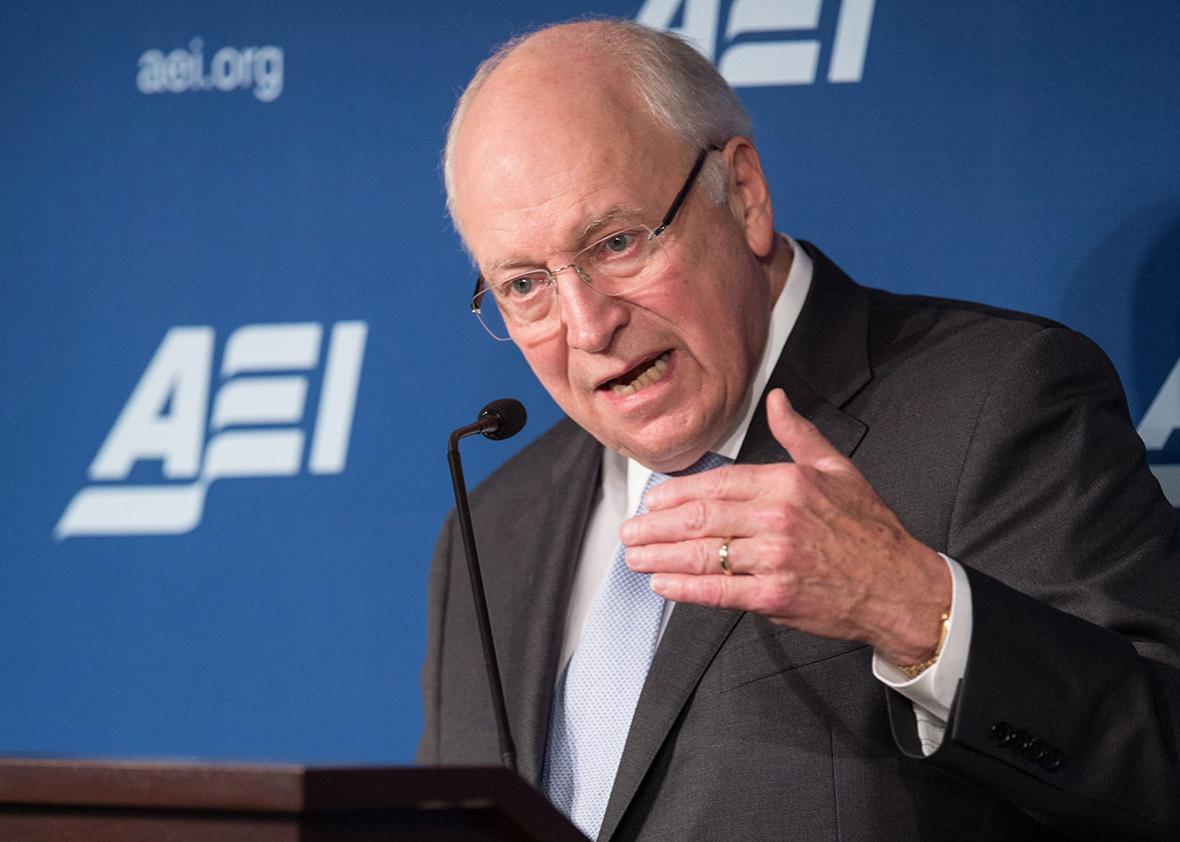There is a lot that was strange about former Vice President Dick Cheney’s anti–Iran deal speech at the American Enterprise Institute on Tuesday morning. First, the deal is essentially done in Congress. Last week, President Obama secured the final Senate vote needed to sustain his veto of congressional disapproval when Maryland Sen. Barbara Mikulski announced her support for the agreement.
Second, if the goal were actually to pick off anyone undecided about the Iran deal, the optics of a Dick Cheney speech at AEI on weapons of mass destruction in the Middle East are just comically bad. Cheney, who made numerous false claims about the threat posed by Iraq’s non-existent weapons of mass destruction, appearing at the Washington think tank that did more than any other to bring about the Iraq debacle is a bit like an unrepentant crook returning to the scene of the crime.
Cheney previewed the speech with a typically mendacious appearance on Fox News Sunday, in which interviewer Chris Wallace had to correct Cheney’s claim that Iran’s nuke program went from zero to 5,000 centrifuges under Obama. Wallace noted that, in fact, this happened on Bush and Cheney’s watch. In typical fashion, Cheney shrugged it off and moved on to the next claim.
This is par for the course for Cheney, and for the worldview he represents. Evidence that runs contrary to his narrative must be dismissed. Acknowledging inconvenient facts is a form of capitulation. Compromising with adversaries on any issue in order to achieve a broader set of goals is indistinguishable from appeasement. And the idea that America, through sheer force of will and, of course, threats of military force, cannot achieve any goal it sets is embracing decline.
“A far better deal is still possible,” Cheney insisted at AEI, and reeled off a list of conditions: “Iran must halt its enrichment and reprocessing activities. It must halt its ballistic missile activities. It must provide a full and complete accounting of all its past nuclear activities. It must allow complete go anywhere/anytime access, including at military sites. There should be no sanctions relief until Iran has fulfilled these obligations. If Iran chooses not to do so, they must understand that the United States stands ready to take military action to ensure they do not acquire a nuclear weapon.” The audience applauded.
“That is how a serious negotiation plays out,” Cheney continued. “That’s how a self-respecting power, with everything in the balance, asserts its vital interests. Insisting on key non-negotiable points and maintaining a credible threat of military force are the indispensable elements of serious diplomacy over the Iranian nuclear program. That is what the administration should have done all along.”
While Cheney is unwilling to examine how this negotiating strategy has fared in the real world, the rest of us should. Back in 2005, Britain, France, and Germany—known as the EU three—were negotiating with Iran over its then-tiny nuclear program and were close to an agreement. But, as former British Foreign Minister Jack Straw subsequently revealed, the Bush administration effectively scuttled the agreement by refusing any compromise on Iranian uranium enrichment. The result? The talks broke down, and Iran’s nuclear program continued to advance at a steady clip, leaving Iran with thousands of centrifuges and a growing stockpile of enriched uranium by the time Obama took office.
This is just one small example of how the Cheney ideology works, or doesn’t, in real life. For a bigger one, we need only to look at the Iraq war itself, which vastly expanded Iran’s regional power and influence by removing the biggest check on its power, the Saddam Hussein regime, and installing in its place an Iraqi government largely made up of Iran’s clients. In other words, the policies Cheney advocated in the previous administration did more to empower Iran than anything Obama has ever done. This bears repeating constantly, if only because the war’s advocates continue to refuse to acknowledge it.
The unwillingness of the war’s supporters to recognize that U.S. military intervention in Iraq produced any bad consequences is matched by their obsessive tendency to see everything in the region as a consequence of the Obama administration’s lack of military intervention. And this gets at what was clearly one of the key goals of Cheney’s speech: laying the groundwork for blaming every bad thing that happens for the next 20 years on the 2015 nuclear deal with Iran and retaking control of a national security narrative that the Iraq war seriously damaged.*
We should also recognize that the Iran nuke deal would probably not have been possible without the Iraq war, which generated considerable American public opposition to large-scale military interventions and greater openness to diplomatic solutions, enabled the rise of a first-term senator from Illinois who had the foresight to oppose the war when it was unpopular to do so, and activated large numbers of Americans to join grassroots organizations like MoveOn and others in opposition to the war. Indeed, one of the most important stories of the congressional fight over the Iran deal has been that a progressive movement that really found its legs during the Iraq debacle found its strength to prevent the next one.
In this sense, the Iran deal should be seen as one of the very few benefits of the Iraq war. Cheney probably deserves thanks for that.
*Update, Sept. 8, 2015: This post has been updated to include a paragraph to further clarify the political strategy of Cheney’s speech on Tuesday.
